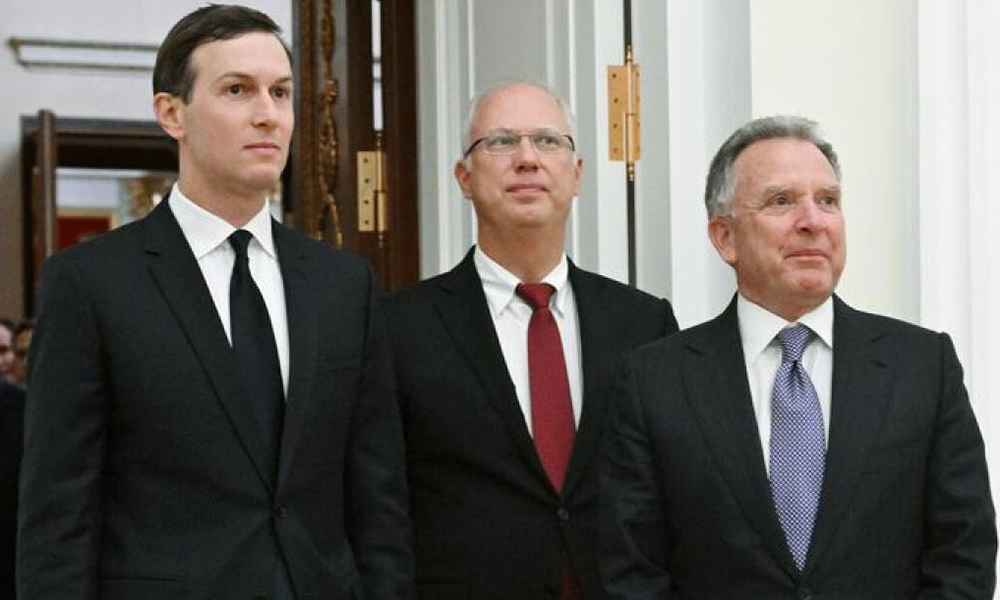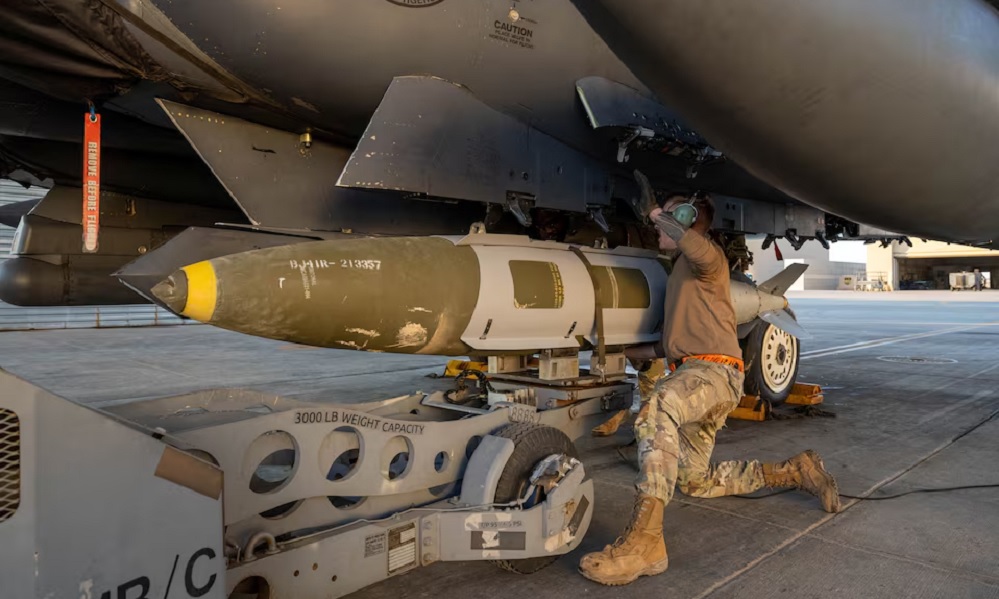World
N. Korea’s Kim oversees ICBM test, vows more nuclear weapons

North Korean leader Kim Jong Un pledged to counter US nuclear threats with nuclear weapons as he inspected a test of the country’s new intercontinental ballistic missile (ICBM), state media KCNA said on Saturday.
The isolated country tested the Hwasong-17 ICBM on Friday a day after warning of “fiercer military responses” to Washington beefing up its regional security presence including nuclear assets, Reuters reported.
Attending the site with his daughter for the first time, Kim said threats from the United States and its allies pursing a hostile policy prompted his country to “substantially accelerate the bolstering of its overwhelming nuclear deterrence.”
“Kim Jong Un solemnly declared that if the enemies continue to pose threats … our party and government will resolutely react to nukes with nuclear weapons and to total confrontation with all-out confrontation,” the official KCNA news agency said.
The launch of the Hwasong-17 was part of the North’s “top-priority defence-building strategy” aimed at establishing “the most powerful and absolute nuclear deterrence,” KCNA said, calling it “the strongest strategic weapon in the world.”
The missile flew nearly 1,000 km (621 miles) for about 69 minutes and reached a maximum altitude of 6,041 km, KCNA said. Japanese Defence Minister Yasukazu Hamada said the weapon could travel as far as 15,000 km (9,320 miles), enough to reach the continental United States.
South Korea’s military said its F-35A fighters and U.S. F-16 jets escorted American B-1B bombers as they conducted joint drills on Saturday, designed to improve their ability to quickly deploy U.S. extended deterrence assets.
On Thursday, North Korea’s foreign minister, Choe Son Hui, denounced a trilateral summit on Sunday of the United States, South Korea and Japan, during which the leaders criticised Pyongyang’s ongoing weapons tests and pledged greater security cooperation.
Choe singled out a recent series of their joint military drills and efforts to reinforce American extended deterrence, including its nuclear forces to deter attacks on the two key Asian allies, Reuters reported.
Kim said the test confirmed “another reliable and maximum capacity to contain any nuclear threat” at a time when he needed to warn Washington and its allies that military moves against Pyongyang would lead to their “self-destruction.”
“Our party and government should clearly demonstrate their strongest will to retaliate the hysteric aggression war drills by the enemies,” he said.
“The more the US imperialists make a military bluffing … while being engrossed in ‘strengthened offer of extended deterrence’ to their allies and war exercises, the more offensive the DPRK’s military counteraction will be.”
Kim referred to his country by the initials of its official name, the Democratic People’s Republic of Korea.
He ordered swifter development of strategic weapons, and more intensive training for the ICBM and tactical nuclear weapons units to ensure they flawlessly perform their duty “in any situation and at any moment,” KCNA said.
According to Reuters unveiled at a military parade in October 2020 and first tested last March, the latest test of the Hwasong-17 demonstrated the capabilities of a weapon potentially able to deliver a nuclear warhead to anywhere in the United States.
Some analysts have speculated it would be designed to carry multiple warheads and decoys to better penetrate missile defences.
The U.N. Security Council will gather on Monday discuss North Korea at the request of the United States, which together with South Korea and Japan strongly condemned the latest launch, read the report.
China and Russia had backed tighter sanctions following Pyongyang’s last nuclear test in 2017, but in May both vetoed a US-led push for more U.N. penalties over its renewed missile launches.
ICBMs are North Korea’s longest-range weapon, and Friday’s launch is its eighth ICBM test this year, based on a tally from the US State Department.
South Korean and US officials have reported a number of North Korean ICBM failures, including a Nov. 3 launch that appeared to have failed at high altitude.
World
Trump plans expanded immigration crackdown in 2026 despite backlash
The plans come amid rising public unease over aggressive tactics, including neighborhood raids and the detention of some U.S. citizens.

U.S. President Donald Trump is preparing to significantly expand his immigration crackdown in 2026, backed by billions of dollars in new funding, even as political opposition grows ahead of next year’s midterm elections.
ICE and U.S. Customs and Border Protection are set to receive an additional $170 billion through September 2029, enabling the administration to hire thousands of new agents, expand detention facilities and increase enforcement actions, including more workplace raids. While immigration agents have already been surged into major U.S. cities, many economically critical workplaces were largely spared in 2025.
The plans come amid rising public unease over aggressive tactics, including neighborhood raids and the detention of some U.S. citizens. Trump’s approval rating on immigration has fallen from 50% in March to 41% in mid-December, according to recent polling.
The administration has also revoked temporary legal status for hundreds of thousands of Haitian, Venezuelan and Afghan migrants, expanding the pool of people eligible for deportation.
About 622,000 immigrants have been deported since Trump took office in January, short of his goal of 1 million deportations per year.
White House border czar Tom Homan said arrests will increase sharply next year as staffing and detention capacity grow. Critics warn that expanded workplace enforcement could raise labor costs and deepen political and economic backlash ahead of the elections.
World
US, Russian officials meet in Florida for more Ukraine talks
Kyiv says it will not cede land that Moscow’s forces have failed to capture in nearly four years of war.

U.S. negotiators met Russian officials in Florida on Saturday for the latest talks aimed at ending Russia’s war in Ukraine, as President Donald Trump’s administration tries to coax an agreement out of both sides to end the conflict, Reuters reported.
The Miami meeting followed U.S. talks on Friday with Ukrainian and European officials, the latest discussions of a peace plan that has sparked some hope of a resolution to the conflict that began when Russia launched its full-scale invasion in February 2022.
Russian President Vladimir Putin’s special envoy Kirill Dmitriev told reporters after meeting U.S. special envoy Steve Witkoff and Trump’s son-in-law Jared Kushner that the talks were constructive and would continue on Sunday. A White House official said the talks had concluded for the day.
“The discussions are proceeding constructively. They began earlier and will continue today, and will also continue tomorrow,” Dmitriev said.
Marco Rubio, Trump’s top diplomat and national security advisor, had said he might also join the talks.
U.S., Ukrainian and European officials earlier this week reported progress on security guarantees for Kyiv as part of the talks to end the war, but it remains unclear if those terms will be acceptable to Moscow.
A Russian source told Reuters that any meeting between Dmitriev and the Ukrainian negotiators had been ruled out.
In Kyiv, Ukrainian President Volodymyr Zelenskiy said on Saturday that Ukraine would back a U.S. proposal for three-sided talks with the United States and Russia if it facilitated more exchanges of prisoners and paved the way for meetings of national leaders.
“America is now proposing a trilateral meeting with national security advisers — America Ukraine, Russia,” Zelenskiy told local journalists in Kyiv.
U.S. intelligence reports continue to warn that Putin intends to capture all of Ukraine, sources familiar with the intelligence said, contradicting some U.S. officials’ assertions that Moscow is ready for peace.
Putin offered no compromise during his annual press conference in Moscow, insisting that Russia’s terms for ending the war had not changed since June 2024, when he demanded Ukraine abandon its ambition to join NATO and withdraw entirely from four Ukrainian regions Russia claims as its own territory, Reuters reported.
Kyiv says it will not cede land that Moscow’s forces have failed to capture in nearly four years of war.
Ukraine’s top negotiator Rustem Umerov said U.S. and European teams on Friday held talks and agreed to pursue their joint efforts.
“We agreed with our American partners on further steps and on continuing our joint work in the near future,” Umerov wrote on Telegram of the discussions in the United States, adding that he had informed Zelenskiy of the outcome of the talks.
The White House did not immediately respond to a request for comment.
Rubio told reporters on Friday that progress has been made in discussions to end the war but there is still a way to go.
“The role we’re trying to play is a role of figuring out whether there’s any overlap here that they can agree to, and that’s what we’ve invested a lot of time and energy and continue to do so. That may not be possible. I hope it is. I hope it can get done this month before the end of the year.”
World
US hits Daesh in Syria with large retaliatory strikes, officials say

The U.S. military launched large-scale strikes against dozens of Daesh targets in Syria on Friday in retaliation for an attack on American personnel, U.S. officials said.
A U.S.-led coalition has been carrying out airstrikes and ground operations in Syria targeting Islamic State suspects in recent months, often with the involvement of Syria’s security forces, Reuters reported.
President Donald Trump had vowed to retaliate after a suspected ISIS attack killed U.S. personnel last weekend in Syria.
Defense Secretary Pete Hegseth said the strikes targeted “ISIS fighters, infrastructure, and weapons sites” and that the operation was “OPERATION HAWKEYE STRIKE.”
“This is not the beginning of a war — it is a declaration of vengeance,” Hegseth said. “Today, we hunted and we killed our enemies. Lots of them. And we will continue,” he added.
Trump said on social media that the Syrian government fully supported the strikes and that the U.S. was inflicting “very serious retaliation.”
U.S. Central Command said the strikes hit more than 70 targets across central Syria, adding that Jordanian fighter jets supported the operation.
One U.S. official said the strikes were carried out by U.S. F-15 and A-10 jets, along with Apache helicopters and HIMARS rocket systems.
Syria reiterated its steadfast commitment to fighting Daesh and ensuring that it has “no safe havens on Syrian territory,” according to a statement by the foreign ministry.
Two U.S. Army soldiers and a civilian interpreter were killed on Saturday in the central Syrian town of Palmyra by an attacker who targeted a convoy of American and Syrian forces before being shot dead, according to the U.S. military. Three other U.S. soldiers were also wounded in the attack.
About 1,000 U.S. troops remain in Syria.
The Syrian Interior Ministry has described the attacker as a member of the Syrian security forces suspected of sympathizing with Daesh.
Syria’s government is led by former rebels who toppled leader Bashar al-Assad last year after a 13-year civil war, and includes members of Syria’s former Al Qaeda branch who broke with the group and clashed with Daesh.
Syria has been cooperating with a U.S.-led coalition against Daesh, reaching an agreement last month when President Ahmed al-Sharaa visited the White House.
-

 Latest News3 days ago
Latest News3 days agoAfghan border forces prevent illegal entry of hundreds into Iran
-

 Latest News3 days ago
Latest News3 days agoPakistan summons Afghan diplomat over deadly attack in North Waziristan
-

 Latest News1 day ago
Latest News1 day agoAfghanistan signs 30-year deal for marble mining in Daikundi
-

 Latest News2 days ago
Latest News2 days agoAfghan health minister calls for medical cooperation between Kabul and New Delhi
-

 Latest News3 days ago
Latest News3 days agoJapan allocates nearly $20 million in humanitarian aid for Afghanistan
-

 Latest News3 days ago
Latest News3 days agoKarzai urges reopening of girls’ schools and universities for Afghanistan’s bright future
-

 Health5 days ago
Health5 days agoAfghanistan seeks India’s support in standardizing traditional medicine
-

 World5 days ago
World5 days agoUS readies new Russia sanctions if Putin rejects peace deal, Bloomberg News reports
























